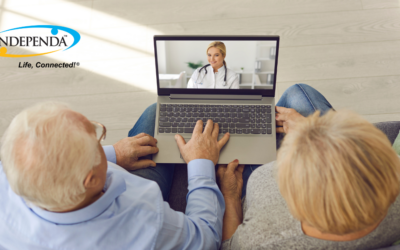For older adults, traveling is not always convenient. There can be an increased risk of slips and falls in winter months, and driving at night can become dangerous. However, it is important that older adults check in with their care providers regularly, especially if there are existing health concerns.
Years ago, a visit with the doctor meant driving into the city, finding parking, navigating a sprawling campus and waiting in a room with outdated magazines until it was your time to be seen. Advancements in technology have made it so this process is no longer necessary, increasing satisfaction for both patients and providers.
Boston Public Radio explored the rise of virtual doctor visits in a recent article. The piece focused on the experience of Lesley Watts, who suffers from a digestive disorder that forced her to schedule regular appointments with her doctor. Instead of experiencing the hassle of commuting or finding a ride and then a rushed appointment at Massachusetts General Hospital, Watts has instead begun receiving a monthly email from her provider.
Instead of being put on the spot to answer questions about her health as quickly as possible, Watts answers the questions at her own pace in the comfort of her own home. She then replies to her doctor with her responses, and the next day receives instructions from her doctor about any changes she should make to better manage her symptoms.
"It asked me questions that I had never been asked before, and as a consequence, I learned about symptoms I had not recognized," Watts told the source. "I believe I received better care because I was able to take my time and provide more accurate answers."
According to a study published in the journal Telemedicine and e-Health and cited by the source, these virtual "visits" take considerably less time than in-patient visits, and both patients and health care providers were generally satisfied with the new process.
"It's often hard for patients to make it into the office for a needed appointment, and by making it easier for them to check in with me for evaluation and management of their chronic condition, I can ultimately do a better job in treating them," explained Dr. Ronald Dixon, who was on the team that created the tool.
Dr. Dixon also told the source that with the online questions, patients tend to offer more information and be more "accurate and insightful" with their responses. He explains that this is a positive both for the provider and the patient, who has to engage with their care more fully.
Of course, it is important that the recipients of virtual care be able to get in contact with their provider quickly and conveniently if they have any concerns. For older adults who are less comfortable with technology, this can pose a challenge.
Fortunately, Independa's integrated CloudCare solution is intuitively designed so that no prior technological knowledge is needed. The solution comes pre-installed on an LG television, a format that the majority of older adults are comfortable with.
Independa's solution is unique in that it addresses the needs of everyone involved in care — from the physician to caregivers to family, and most importantly, the care recipient, making the care process inclusive and convenient.
The Angela software interface includes effortless access to video chat, health information, appointment and medication reminders and easy photo and message sharing. Independa's award-winning solutions are redefining independence and helping to revolutionize innovative caregiving.
Contact us through our online form to schedule a demo.




